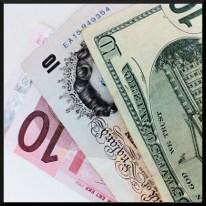Quick English: Money Talks
There are some things that are essential to living or traveling in a new country. One of those is understanding how the currency works, and how to talk about it. Though it is not difficult to pay for something with "five dollars," when a friend of yours asks to borrow a "fiver," it may not be as clear.
Below is some common slang for money in some English-speaking countries.
Terms used in several countries:
fiver: A note worth 5. ($5, £5, etc.)
tenner: A note worth 10 ($10, £10, etc.)
grand: 1000 of a currency ($1,000, £1,000, etc.)
dough: General word for cash
change: The money returned when a payment is more than the amount needed
UK:
British money is measured in pounds sterling and pence, though people mostly just say pounds and pence. 100 pence = 1 pound.
Currency is either written as 50GBP or £50, with coins less than £1 called pence or p. (50 pence = 50p, or half of a pound)
Collectively, paper money is known as notes.
USA:
American money is divided into dollars and cents. 100 cents = 1 dollar.
Currency is either written as USD100 or $100, with coins less than 1 dollar called cents and written as 50¢.
Collectively, paper money is known as bills.
1-cent coin is called a penny.
5-cent coin is called a nickel.
10-cent coin is called a dime.
25-cent coin is called a quarter.
One Dollar is also known as a single.
Cash is a term money in general, as well as a way to pay. The question "Cash or credit?" means would you rather pay with actual money or on a credit/debit card?
Bucks is a plural slang term for dollars. "I paid 20 bucks for this shirt."
Canada:
Currency in Canada is also called dollars and cents. It is written as 1CAD, C$1 or $1.
Collectively, paper money is called bills.
In Canada, there is both a $1 coin and a $1 bill. The $1 coin is also called a loonie.
There is also a toonie (two loonies), which is a $2 coin.
Australia:
In Australia, money is divided into dollars and cents.
Collectively, Australian dollars are called notes.
Australian bills, in slang, are referenced by their colors. A ten dollar note is called a blue-tongue because the note is mostly blue.
A twenty-dollar note is known as a lobster because the note is mostly red.
A fifty-dollar note is called a pineapple because the note is mostly yellow.
However, a one-hundred-dollar note is known as a hundi-stick.
New Zealand:
New Zealand currency is divided into dollars and cents.
Collectively, New Zealand dollars are called notes. It is written as 50NZD, NZ$50 or $50.
The New Zealand dollar is also called the kiwi.
New Zealanders also call their money dosh.
Would you like to earn some extra dough while studying English? Why not take a paid work and study course with Kaplan?

